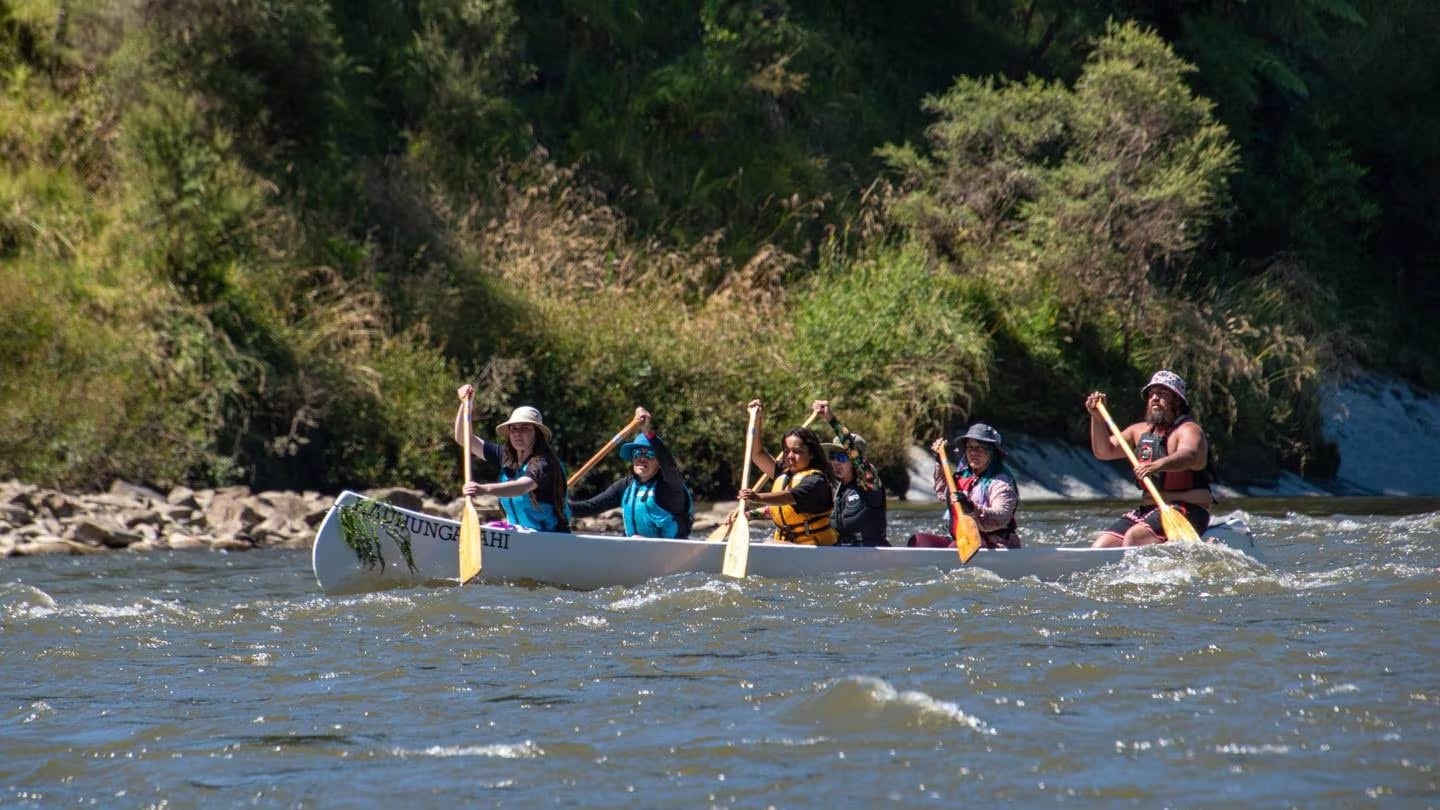Whanganui River iwi have thanked tourist operators and river users after reserving sections of the river for the sole use of their two-week annual tribal wānanga.
The 12-day Tira Hoe Waka in early January activated a customary activities provision in the Te Awa Tupua (Whanganui River Claims Settlement) Act 2017 for the first time.
It closed parts of the river to tourists, tour and jetboat operators and all other river users for up to three days at a time as the Tira Hoe travelled down the river.
The restrictions included the Department of Conservation (DoC), DoC campsites and tourists on the Te Araroa Trail,and the Great Walks Whanganui Journey.
Ngā Tāngata Tiaki o Whanganui kaihautū/chief executive Nancy Tuaine said the Tira Hoe Waka was able to make the 230km journey without any other activities or users on the river, the banks and campsites.
“From the top reaches to the bottom, we were able to come down the awa without anybody else being on the water at the same time as us,” Tuaine said.
“It allowed us for the first time in 36 years to wānanga uninterrupted.
“In previous times, we might be in the middle of a wānanga and have come together to waiata or to talk about different kāinga or wāhi as we’re going past them, but we might be interrupted by a jetboat or other paddlers.
“To be uninterrupted made it a different and very special experience.”

Nearly 130 paddlers and their road crews started out from Ngā Huinga near Ngāpuwaiwaha Marae in Taumarunui on January 5. The Tira arrived at Pūtiki Marae in Whanganui on January 16.
Paddler Erena Page, 17, said being on the first Tira “to have the awa to ourselves” was an amazing experience.
“I was able to immerse myself in our wānanga without the distraction of tourists on jet boats all pulling out their phones and taking photos of us.
“It’s really strange to be considered a photo opportunity for tourists just because we’re in a group paddling down our own awa.”
Page completed the Tira Hoe with her mother who, in 1989 - 35 years ago - paddled the awa for the first time with her own mother.
“It’s pretty cool having that sort of generational connection,” Page said.
“My father and younger brother were roadies this year too, and they got to experience some of the Tira magic.
“The Tira Hoe Waka is very special to me because it allows me to learn about our Whanganuitanga and reconnect to where I come from, especially since I’ve grown up and live in Porirua.
“It’s helped me understand the whakataukī ‘He muka nō te taurawhiri a Hinengākau’ (a strand from the woven rope of Hinengākau), because I can see that in the faces and hear it in the whakawhanaungatanga (relationship building) of everyone who takes part.”
Tuaine said the decision to reserve sections of the river for iwi use was supported after more than a year of consultation and planning with operators, DoC, Te Araroa Trail, and councils.
“We needed to get a lot of people onboard. We want to thank them for supporting us to achieve this.”
This included the rowing community, Waimarie paddle steamer and tourist operators.
“There were implications for their business, and we talked to some about that, but the whole reason for the settlement was to actually ensure that we reclaim and strengthen our ability to hold our relationship with the river.”
Canoe hire and tour operator Cameron Peters said he backed the initiative and understood the significance to iwi of spending time on the river with no distractions.
“I’m part of the river too, and the river’s part of me, so I understand what they were doing. It was a good thing for the river, it was good for the people, it was great all round.”
Peters runs Yeti Tours, which has been operating for more than 50 years.
“It didn’t seem to deter the tourists, they just changed their booking dates. It all went very well. It was well-organised and we were all given plenty of notice.”
LDR is local body journalism co-funded by RNZ and NZ On Air.
- NZME


